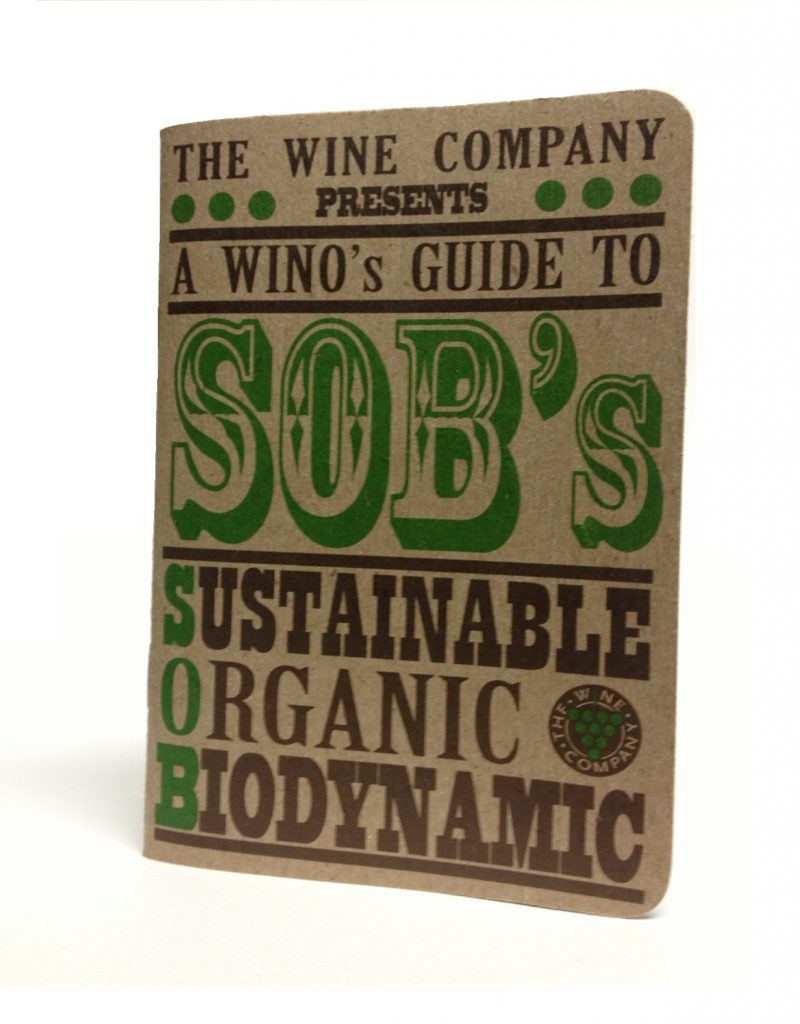GREEN PAGES
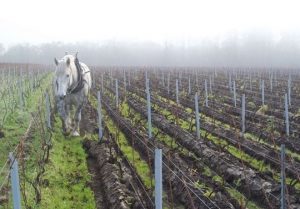
@WINECOMN IS GREEN | #makingeverydayanearthday
SUSTAINABLE // ORGANIC // BIODYNAMIC // VEGAN // SOLAR POWERED
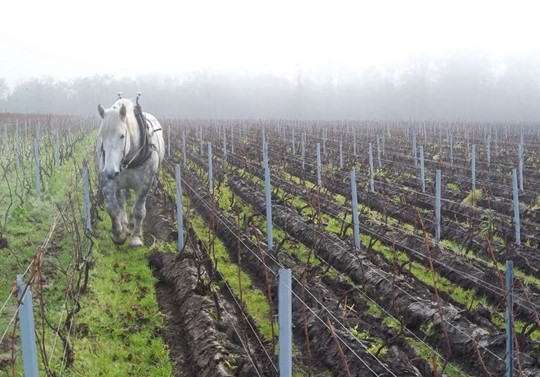
SUSTAINABLE
A commitment to sustainable agriculture gives a grower the flexibility to address potentially cataclysmic threats to their vineyard while remaining a faithful steward of the lands they are working. The goal of sustainable agriculture is to farm organically when possible, while retaining the ability to react to problems that might otherwise ruin a harvest.
Sustainable growers use synthetic chemical additives in their vineyards only as a last resort, and not at all in many vintages. Many sustainable producers are growing grapes and other crops in marginal climates that simply do not allow them the luxury of farming completely organically every vintage. Other sustainable growers are working towards their organic certification but do not yet have a long enough history of organic farming in their vineyards to qualify.
Alexander Valley Vineyards
Alexis Bailly Vineyard
Andrea Felici
Angulo Innocenti
Anton Bauer
Aplanta
Argyle
Asnella
Barco de Piedra
Baron de Seillac
Beckmen Vineyards
Bethel Heights Vineyard
Bianchi Winery
Blanchet | Domaine Francis
Botani | Bodegas
Bouchard Pere et Fils
Breban | Vins
Breca
Brundlmayer
Bulletin Place Wines
Canvasback
Caparzo
Casanova di Neri
Caves de Saumur
Chasing Venus
Chateau d’Aydie
Chateau Perron
Cline Cellars
Courtois | Domaine
Darnaud | Emmanuel
Darting
Decero | Finca
Decoy
Dewazakura
Dog Point Vineyards
Dom. de la Bretonniere
Dom La Croix Montjoie
Dom de la Rochelierre
Domaine Drouhin Oregon
Donnhoff
Duckhorn Wine Company
Duxoup Wine Works
Eguren
Empire Estate
Emporio
Enotria
Errazuriz
Erstwhile Mezcal
Eugenie | Chateau
Failla Wines
Fattori
Felsina
Figueirasse | Dom. de
Foster | Enrique
Gaillard | Pierre
Garofoli
Gaston Chiquet
Goats do Roam
Gobelsburg | Schloss
Goldeneye
Graziano
Green & Red Vineyard
Haag | Fritz
Hakutsuru Sake Brewing Company
Hamilton Russell Vineyards
Hedges Family Estate
Hiedler
Iron Horse Vineyards
Ironstone
Jim Barry
Kamoizumi
Krutzler
La Cana
La Playa | Vina
La Valentina
Le Casematte
Left Coast Cellars
Leonetti Cellars
l’Ermitage | Chateau
Les Hauts Plateaux
MacRostie
Marchesi di Gresy
Marchesi Pancrazi
Marco Felluga
Masumi
Matchbook Wine Company
McNab Ridge Winery
Melville Winery
Michelet
Migration
Miner Family Vineyards
Minuty
Miraval | Chateau
Mohua
Mongeard-Mugneret
Mont Olivet | Clos du
Monte Volpe
Montelena | Chateau
Morey | Thomas
Mossback
Mount Eden Vineyards
Muga
Muriel | Bodegas
Nisia
Ordonez & Co
Paetra Wine Company
Paitin
Paraduxx
Pedroncelli Winery
Perrin et Fils
Perrin Freres | Nicolas Jaboulet
Peter Michael Winery
Phillipe Girard
Pichot | Domaine
Pierre Callot
Ponzi Vineyards
Portas da Herdade
Pousse d’Or
Powers Winery
Quinta da Raza
Ragotiere
Ridge Vineyards
Rio Madre
Sabe
Santadi
Sattler | Weinbau
Sawbuck
Scaia
Selbach | J. & H.
Selbach-Oster
Senorio de San Vicente
Shafer Vineyards
Sierra Cantabria
St Gregory
St Pierre | Prieur & Fils
Tascante
Tenuta Sant’Antonio
Tenuta Scersce
The Eyrie Vineyards
TintoNegro / 55 MALBEC
Trefethen Vineyards
Triton
Vallado | Quinta do
Vara y Pulgar
Vignerons de Tavel
Vigneti del Vulture
Villa Wolf
Vogue | Dom. Comte Georges de
Von Schleinitz Estate
Weil | Robert
White Rock Vineyards
Zuani Vineyards
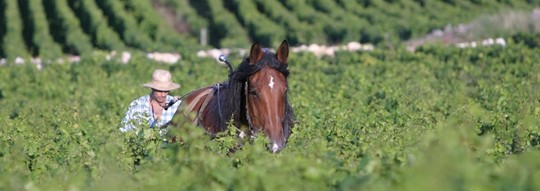
ORGANIC
Most organic wines are in fact made from organically grown grapes but not vinified “organically” likewise for spirits. The obstacle to organic winemaking is the prohibition of sulfur compounds in the winemaking process. For better or worse, the addition of minute levels of sulfur dioxide at the end of the winemaking process is what keeps wines stable in the bottle long term. Not to add a few parts per million of SO2 when finishing your wines often invites disaster in our cellars.
Organic grape farming, however, is becoming widely popular as more and more winemakers have recognized that they simply get better fruit from the vineyards that are farmed organically than those that are farmed using conventional methods. Organic certification, which is currently handled by several competing authorities, at its base requires the grower to demonstrate that they are working without chemical fertilizers, weed killers, insecticides, and other synthetic chemicals. These wineries and farms must demonstrate that the vineyards and fields in question have been handled in accordance with these organic prohibitions for between five and seven years before certification is possible.
Alois Lageder Winery
Altos las Hormigas
Antico Colle
Argyle
Badger Mountain & Powers
Badia a Coltibuono
Barraud | Domaine
Baumard | Domaine des
Beaucastel | Chateau de
Beaux Freres
Brundlmayer
Bulletin Place Wines
Calera
Carillon | Domaine Francois
Carro Tinto
Cartuja
Centorri
Chanson | Domaine
Chateau Climens
Cortijo
Domaine de Noire
Domaine des Lauriers
Domaine Drouhin Oregon
Drouhin | Joseph & Vaudon
Ecker | Weingut
Escalada do Sil
Evesham Wood
Eyrie Vineyards
Fattoria Selvapiana
Fitapreta
Flaco
Flor del Desierto Sotol
Frascole | Azienda Agricola
Frog’s Leap
Geoffroy Champagne
Haden Fig
Hans Reisetbauer
Hofer
Inama
Jean Luc Pasquet
La Playa | Vina
Li Veli
Liger-Belair | Thibault
Lucien Le Moine
Mas de Gourgonnier
Mas Lauris
Matrot | Thierry et Pascal
Messmer
Michel | Louis
Miraval | Chateau
Mont Olivet | Clos du
Muller-Catoir
Naveran
Nigl
Nikolaihof Wachau
Orleans-Borbon Manzanilla
Perrin et Fils
Petrolo
Ponzi Vineyards
Protocolo
Quinta da Muradella
Quinta da Saes
Ronco Calino
Russiz Superiore
Saladini Pilastri
San Michele a Torri | Fattoria
Santini | Enrico
St Innocent Winery
Tablas Creek Vineyards
Tamagawa
Vietti
Vizcarra
Von Othegraven
Von Winning
Warre’s
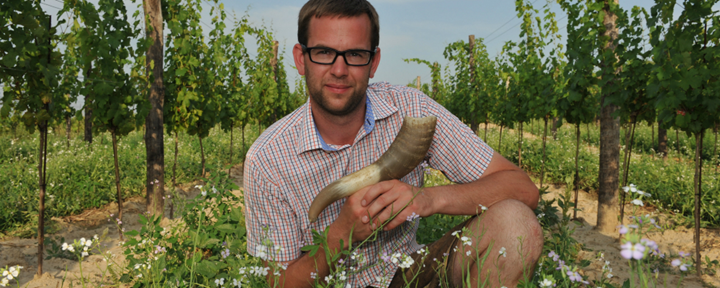
BIODYNAMIC
Based on the teachings of Rudolf Steiner, Biodynamics is a response by farmers who are concerned about the degradation of their lands. The basis is more than just the prohibition of synthetic chemicals, but a commitment to actions which ensure a proper balance and harmony between land, plants, and the environment. The guiding principles are 1) to upgrade the soil and plant life in its natural environment using products made from vegetable, animal, and mineral matter, 2) the application of these products at specific times during annual cycles, 3) working the land by tilling and hoeing to enhance the soil’s natural capacity to nourish the plants and animals within its reach.
In essence, biodynamics is organics and beyond. At its most basic, the biodynamic approach to grape-growing sees the vineyard as an ecological whole: not just rows of grapevines, but the soil beneath them—an organism in its own right—and the other flora and fauna in the area, growing together interdependently. It is the idea that farming must be attuned to the spiritual forces of the cosmos. This might mean timing sowing and harvesting to the phases of the moon or the positions of the planets; it also might mean burying cow manure in a cow’s horn over the winter for application to the vineyards in the spring. Trials show the Biodynamic Calendar Days have an impact on the sensory impressions of the wines and spirits we drink so ask any of us at The Wine Company if you wish to explore this further. Great fun.
Alois Lageder Winery
Barraud | Domaine
Baumard | Domaine des
Cauhape | Domaine
Chateau Climens
Drouhin | Joseph & Vaudon
Ecker | Weingut
Fevre | Domaine William
Frog’s Leap
Girardin | Domaine Vincent
Gouges | Domaine Henri
Hirsch | Josef
Il Ghizzano | Tenuta
Marques de Gelida
Nigl
Nikolaihof Wachau
Telmo Rodriguez
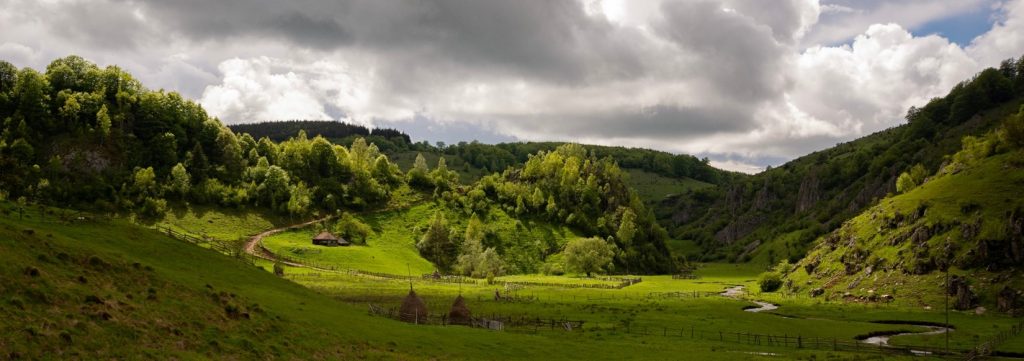
VEGAN
A wine designated vegan means that no animal by-products have been used in any part of the winemaking process. Vegan goes far beyond animal welfare to the costly consequences such land management, the consequent carbon footprints, and the increased petrochemicals ranging from fertilizers to pesticides required to grow feed. Many of these producers were the first to reduce the weight of their glass bottles and mind other environmental impacts.
All Sake from Japan
Argyle
August Kessler
Blu Prosecco
Bulletin Place Wines
Campuget
Champagne Goutorbe
Champagne Pierre Gimonnet
Cline Cellars
Donnhoff
Dr Loosen
Henry’s Drive
Messmer
Miner Family Vineyards
Nine Stones
Poliziano
Prieler
Schrock | Weinbau Heidi
Selbach | J. & H.
Selbach-Oster | Weingut
St Innocent Winery
Tablas Creek Vineyards
Tommasi
Warre’s
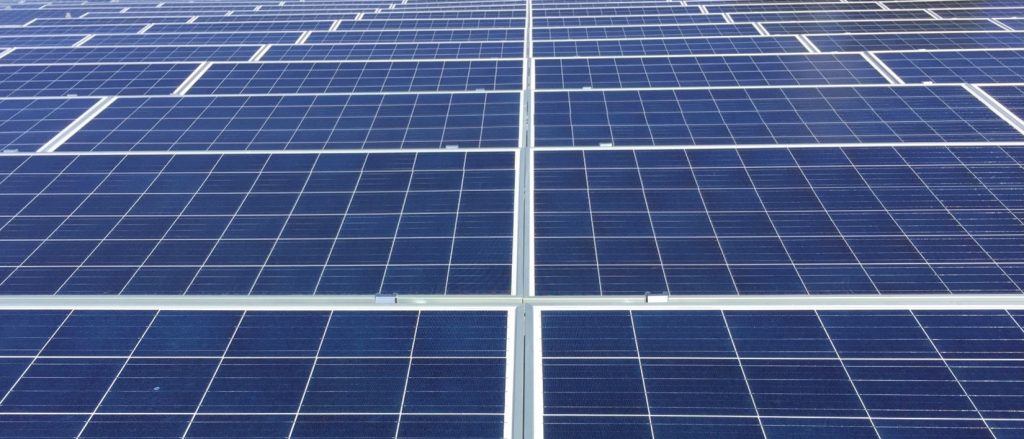
SOLAR POWERED
As Minnesota’s First Solar Powered Wine Distributor, The Wine Company is committed to sustainable initiatives at every turn. As an importer with a strong focus on sustainable, organic, biodynamic and vegan wines, it comes as no surprise that many wineries in this wish-list of a portfolio are solar powered as well. In an age of global warming and the climatic upheaval in response, migrating to solar power is the right thing to do -not only for its common sense but the dollars and sense of it.
Our Earth receives more energy from the sun every hour than all the people on the planet consume every year. Sunlight provides a boundless renewable energy -not only to ripen all the grapes in all the vineyards sourced by The Wine Company but also to power their temperature-controlled warehouse, offices, and entertaining areas that host every sort of educational trade tasting. Rest assured that The Wine Company’s commitment to the environment does not end in the bottle itself but proves a raison d’etre and a shining example of what is to come.
Alexander Valley Vineyards
Badger Mountain & Powers
Bethel Heights Vineyard
Cline Cellars
Domaine Drouhin Oregon
Failla Wines
Frog’s Leap
Goldeneye
Green & Red Vineyard
Left Coast Cellars
Miner Family Vineyards
Chateau Montelena
Mount Eden Vineyards
Ponzi Vineyards
Powers Winery
Ridge Vineyards
Shafer Vineyards
Trefethen Vineyard
Valentine Distilling
Care to learn more about sustainable wine?
Enjoy our Wino’s Guide to SOBs: Sustainable, Organic, and Biodynamic >>>


